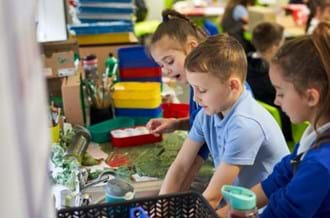Supporting your child after the death of a loved one
Supporting your child after the death of a loved one

Husna Rahman
School Project Manager - Husna is a qualified counsellor with experience working with children, young people and families. In 2021, she joined Place2Be as a School Project Manager in East London. Husna has written her first children’s picture book themed around loss and grief, which launches in September.
Place2Be School Project Manager, Husna Rahman, has recently written a children’s book on grief and loss. In this blog, she shares her experience of supporting her child through the loss of a loved one, and her advice for parents.
I was still on the prayer mat when I got the news. My daughter, who was five years old at the time, came into the room and wrapped her arms around me, reacting to the tears she saw running down my cheeks. I remembered uttering the words: "nana Bhai (grandad) died and has gone back to Allah". She went quiet, and when I told her it was ok to be upset, she burst into tears.
Grief can be challenging enough for adults who have spent years developing the emotional intelligence and tools to manage complicated circumstances. But for a child, grief can play out differently.
Although we often feel like we are protecting children by not talking about difficult situations, not acknowledging changes in behaviour stemming from grief may be detrimental to the child. Children may not be able to understand death like an adult can, but they can still sense something is wrong. The more we keep from them, the more they can start to feel that they have done something wrong and internalise the blame.
We may believe that children should not have to deal with these obstacles early on. The truth is that life events such as bereavement are unavoidable. Death is a sad reality that many young children face. Withholding information from them can often do more to exacerbate the hopelessness they may be experiencing and can make them feel more confused about their feelings and the situation. Winston's Wish, a charity for bereaved children, suggests communicating to children directly and honestly. Little by little, information can be given to the child, so they can interpret what has happened.
Growing up in a South Asian household, we rarely spoke about death, and there didn't seem to be much opportunity to ask questions about relatives who had died. This was perhaps my parents' way of coping with their loss and not knowing the 'right way' to go about it. Subsequently, this made me feel that it was a taboo subject, and I didn't know how to react whenever I heard the news of someone's death. Children are often curious about what happened; speaking to them in a language they understand is important instead of avoiding the topic altogether.
I realised how much my childhood experiences played a part when I lost my dad. I wanted to ensure I said the 'right thing' to my daughter, even though I knew there is no right or wrong way to grieve. I didn't want to put on a brave face because seeing my parents doing just that made me feel that there was no room for me to explore my feelings.
I wanted to further speak about death in an age-appropriate way. I looked for children's stories to support me in starting that dialogue with my daughter. That's when I realised that there was not much representation of south Asian Muslim characters in children's books and hardly any on the theme of loss and grief. I decided to write my own. The grief journey can feel so lonely for children. If they can see people who look like them also going through something similar, they can gain comfort and develop empathy.
Letting children have a voice and tell their version of events is important. Through stories, we can spark that dialogue about death and dying so that it becomes the norm, as death is a part of life.
Tips to support children with communicating their feelings after the death of a loved one:
- Don't assume that children won't know what's going on; instead, check in with them to explore their understanding.
- Avoid using euphemisms such as 'passed away', 'gone away', 'has been taken' or 'lost'. This will eliminate any idea that it is something that has happened temporarily.
- Encourage children to express their feelings and talk about the person who has died. It's not always easy for children to talk openly about this, so you could try creative play such as using sand trays, toys, painting/drawing a picture etc.
- Encourage the building of memories by creating a memory box containing things that will help children to remember the person who has died.
- Acknowledge children's feelings and reassure them that they are not to blame for what has happened.
- Speak to children using age-appropriate language, and also remember to consider religious and cultural practices
Other resources you may find useful
If you are looking for more guidance on supporting a child or young person through loss, the below resources may be helpful.
News & blogs

Uniting health and schools to improve mental health
Read Place2Be Chief Executive, Catherine Roche's, thoughts on uniting health and schools to improve mental health.
Read more
Bukhman Philanthropies Partners with Place2Be to Support Children and Young People’s Mental Health
Read about Bukhman Philanthropies' partnership with Place2Be to support Children and Young People’s Mental Health
Read more
Royal Foundation Centre for Early Childhood Funds Innovative Mental Health Pilot
The Royal Foundation Centre for Early Childhood is funding an innovative new pilot with Barnardo’s and Place2Be.
Read more



